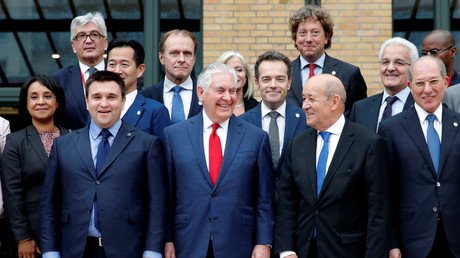'France will strike' if proof found chemical weapons used in Syria - president

Emmanuel Macron has promised to “strike” Syria if any evidence emerges that chemical weapons were used against civilians. However, he added that French intelligence agencies do not have proof to back up such allegations.
“On chemical weapons, I set a red line and I reaffirm that red line,” Macron told reporters in Paris on Tuesday. “Today, our agencies, our armed forces have not established that chemical weapons, as set out in treaties, have been used against the civilian population.”
If any evidence is found, France will strike the places where chemical weaponry shipments "originate," he added. The French President also recalled his phone conversations with Russian President Vladimir Putin, which took place last Friday.
“I've reiterated it to President Putin, asking to make it very clear to the Syrian regime, which has reaffirmed that it does not use chemical weapons … but we are watching it,” Macron stated.
While President Macron has been mulling “immediate reprisals” for chemical weaponry usage in Syria since assuming office, France has not undertaken any action due to “the lack of certainty on what happened in Syria,” French Defense Minister Florence Parly said last Friday.
The country prefers to avoid any hot-headed moves and does not act without having reliable information on the alleged chemical incidents.
“We have some indications of possible chlorine use [in Syria], but we have no absolute confirmation,” the Minister said. “So we, alongside the others, are working on trying to confirm this, as we clearly have to get the facts straight.”
The French Foreign Minister, however, pointed fingers at the Syrian government, stating last week that “all indications show us today that chlorine is used by the regime right now in Syria.”
The most recent allegations of a possible chemical attack in Syria emerged last month. The accusations were purveyed by controversial sources, including the notorious White Helmets NGO and the UK-based Syrian Observatory for Human Rights (SOHR). The allegations have not been independently verified so far.
The reported incident coincided with a conference held on January 23 in Paris, where the US and some 20 other nations created an ‘International Partnership against Impunity for the Use of Chemical Weapons.’ US State Secretary Rex Tillerson was quick to blame Syrian government and even Moscow for the “attack,” despite the lack of any solid information on it, stating that Russia ultimately bears responsibility for any chemical weaponry-related incident regardless of who conducted it.
Moscow, in turn, condemned the gathering as an example of “quasi-collective approach” and an attempt to steal the show from the already existing international bodies and the UN platform, namely the Organization for the Prohibition of Chemical Weapons.
Macron’s new statements came amid a warning produced by the Russian Center for Reconciliation in Syria about a possibly looming chemical “provocation” in the country. The Center received a tip from a resident of Serakab in Syria’s Idlib governorate. The source claimed that the Al-Nusra Front (currently known as Tahrir Al-Sham) terrorist group brought some 20 chlorine canisters along with individual protection equipment to the village, while the White Helmets staged “first aid” drills with “local residents” who were supposedly suffering from poisoning. Such activity might indicate a new attempt to stage a chemical incident targeting civilians and then framing the Syrian government for it, the Center warned.















